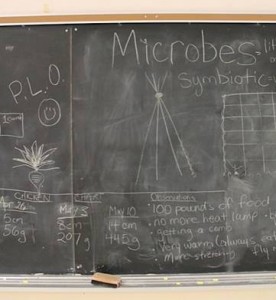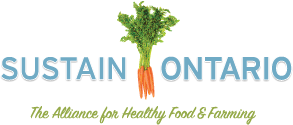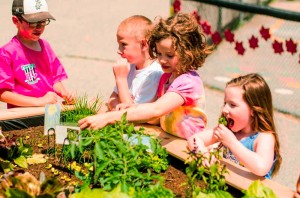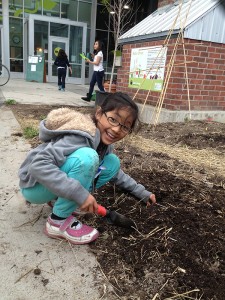Network Activities
Network Action Plan
Since January 2012, the Network has been taking steps to better understand and identify actions to support all of you who are working with children, youth, and healthy food systems.
Summary of priority actions:
The following summarizes our current priorities for action (more info is available under the summary).
** Section numbers refer to those in the comprehensive Action Plan
1) Advocacy:
- Campaign for Universal Student Nutrition Program with a strong food literacy focus (build on Healthy Kids Strategy recommendations 2.8 and 2.9) (C.1.1)
- Advocate for the Government of Ontario to recognize school gardens as important places for food literacy (C.1.3)
- Advocate for cooking and food skills programs to be made accessible to all Ontario children (C.1.4)
2) Information Sharing and Coordinated Action:
- Share organizations’ stories, successes, challenges, and contacts using the Network website and newsletter (see A.2.1, B.1.2, B.1.5, B.1.7, B.1.9, B.1.11, B.2.1, A.1.4, A.1.2)
- Develop and promote a searchable directory of organizations that includes types of programs offered, skills and resources to share, opportunities for mentorship, and other directory information (see B.1.3)
- Coordinate the development of local food action hubs among community organizations that have delivered local food in schools projects (A.1.9)
3) Resource Development:

A lesson on soil for the Farmers in the Playground program at Evergreen Heights in Emsdale. Credit: Kelli Ebbs.
- Develop a comprehensive snap shot of the state of student nutrition programs in Ontario with metrics and success stories (see B.1.13)
- Create and share resources for schools, parents, community members and organizations to use to advocate for food literacy programming and increased resources for SNPs (presentations, hand-outs, fact sheets, case studies, toolkits, videos, social media campaign, etc.) (B.4.1)
- Develop and implement (a) age-appropriate benchmarks and (b) a common evaluation tool for food literacy and food skills (see A.1.8, A.2.3, B.3.6, B.4.4)
- Compile scans on community and school gardens (in progress) (B.3.2)
- Compile updated scan on regional food hubs (in progress) (B.3.3)
- Prepare a tip sheet for community organizations to approach school boards (B.4.2)
- Develop a directory of outside-the-classroom food education programs that can be used by teachers (B.1.8)
- Prepare a factsheet of ‘how gardens impact the community’ to use in educating funders and in other communications efforts (A.2.2, B.4.3)
- Develop a list / point to existing lists of possible relevant grantors (B.1.6)
How we arrived at these priorities, and additional documents
In Phase 1 of our action planning process, we conducted an environmental scan and needs assessment (see a summary of responses to our preliminary survey from January 2012 – February 2013). In Phase 2 of our action planning process teams were selected to explore specific needs and opportunities relating to 6 priority areas of the network and to develop a network action plan (see our call for applicants for more information about the process). For the results of this process and what we heard see:
- Summary of Action Plan
- Full Action Plan (consolidating 6 themes below)
- Food in the Curriculum Action Plan (Full) | Summary
- Food Education Outside of the Classroom Action Plan (Full) | Summary
- School and Community Food Gardens Engaging Children Action Plan (Full) | Summary
- Food Skills and Cooking Programs Action Plan (Full) | Summary
- Local / Sustainable Food In Schools Action Plan (Full) | Summary
- Student Nutrition Programs Action Plan
All of these are living documents – they will change and evolve as the Network moves forward.
Contact:
We would love to hear your feedback, answer or your questions, or get you involved in helping us move this plan forward. To get in touch, please contact Carolyn Webb, Ontario Edible Education Network Coordinator: cwebb@sustainontario.ca.
Related News on the Sustain Ontario Blog
-
2022 Vote ON Food Campaign!
Sustain’s 2022 #VoteONFood Campaign is live! Ahead of the provincial election, we invite you to visit SustainOntario.com/Vote-ON-Food/ for our 2022 Good Food and Farming Ideas, each detailed with Issues, Evidence, and Action Items: Support Sustainable Farming: Enable Future Farmers and Preserve Farmland Bring Healthy Food and Food Literacy into Ontario Schools Support Community Growing Enable […]
read more -
Petition to Identify Community Gardens as Essential Service
We would like to thank everyone who has signed our open letter, which now has over 6,000 signatures, calling on the province to identify community gardens as an essential service. For those who missed it, Sustain Ontario is facilitating an open letter calling on the Province of Ontario to identify community gardens as essential community […]
read more -
Open Letter Calling on Province to Identify Community Gardens as Essential Food Service
Sustain Ontario is facilitating an open letter—for any organization in the province to support—that identifies Community Gardens as essential community food services which must be exempt from the recently announced closure of recreational spaces by the Province of Ontario. Please scroll down to sign the Open Letter Organizations are further encouraged to share this information […]
read more -
BFH Program Streams Announced: Apply to be a Session Coordinator by July 15th!
We are inviting individuals and organizations to help shape the program by becoming session coordinators. These coordinators will work with the program committee to recruit speakers and outline the important conversations that will inform the next steps for sustainable food systems work in Ontario.
read more -
Webinar Recording: Community Garden Accessibility
The webinar provided a discussion of accessibility requirement for public spaces as part of the Accessibility for Ontarians with Disabilities Act (AODA) as well as examples from Waterloo Region of great work being done to make community gardens more accessible and inclusive. The impetus for this webinar came up from questions raised on the Ontario Community Garden Network list-serve about how AODA legislation would affect community gardens and what resources were available to help community gardens comply.
read more -
Webinar Recording: Healthy Corner Store Initiatives
A recording of the Healthy Corner Store Initiatives webinar that took place on March 4th, 2015 is now available for online viewing. Below you can access the webinar recording (password available to Sustain Ontario members, supporters, and event attendees) as well as view the slides from each presentation. This webinar was part of a series […]
read more -
Webinar Series: Healthy Food For All
Join the Ontario Healthy Communities Coalition for two free webinars (Mar. 26 + Mar. 30) to learn more about the collaborative Healthy Food For All project! As project partners, Sustain Ontario will be presenting a summary of 4 Peer Learning Circles’ activities which we have hosted over the past year. Register today!
read more -
Food Access: Community Models for Vibrant Farmers’ Markets
This webinar is the 5th in a series of conversations around food access and policy within our network and we invite you to take part. To learn more about the Food Access Peer Learning Circle (PLC) and how to be involved please contact Bronwyn Clement, bronwyn@sustainontario.ca Join us for a webinar from 2-3:30pm on Wednesday, […]
read more -
Webinar Recording: Local Food Procurement in the Ontario Broader Public Sector
By addressing these issues as a group and releasing these resources publicly, we intend to encourage Ontario’s municipal leaders to ask the right questions, think outside of the box, and develop meaningful local procurement plans for the future.
read more -
Media Release: The Law Leaves Room for Local Food
Local food has economic, environmental, health and community benefits. But many municipalities wishing to support local food are afraid to show local preference for fear of contravening procurement and trade laws.
read more
“Too often, policies and trade law are cited as barriers when there are clear examples of how this can be done within the law. That is why Sustain Ontario is working to clarify these concerns and share examples of how this can be done,” says Carolyn Young, Sustain Ontario’s Director.


